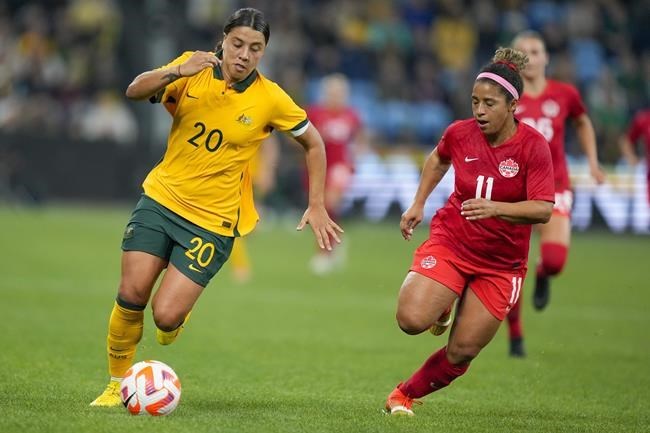SYDNEY (AP) — Australia’s Matildas have called for equal prize money for soccer's global showpiece tournaments just days out from kicking off the Women’s World Cup in Sydney.
Australia and New Zealand are co-hosting the biggest Women’s World Cup to date and both national teams will start their group campaigns on Thursday.
All 23 members of Australia’s World Cup roster, including star forward Sam Kerr, spoke in a video released by the players’ union on Monday to acknowledge the growth of the women’s game but to highlight that the total prize money at the 2023 World Cup is about one-quarter of what was on offer at the men’s World Cup last year.
The Australian men's and women's teams receive the same minimum percentage of prize money under Football Australia's collective agreement.
“Collective bargaining has allowed us to ensure we now get the same conditions as the Socceroos, with one exception,” midfielder Tameka Yallop said in the video produced by Professional Footballers' Australia. “FIFA will still only offer women one-quarter as much prize money as men for the same achievement.”
The overall prize pool for the 2023 Women's World Cup is $110 million. FIFA has allocated $152 million for the tournament, including the prize money plus preparation payments for the 32 teams and compensation paid to clubs, and said that is three times more than it allocated for the 2019 edition. The prize pool for the men's World Cup was $440 million.
“While prize money has advanced, it’s still only 25 per cent of what the men get, and FIFA are championing that that’s equality and there’s still no assurance that there will be equality,” PFA co-chief executive Kate Gill told Australian Associated Press.
Gill said the argument that broadcasting rights and sponsorship income contributed to the uneven payments didn't cut it.
“They’ve got $4 billion in reserves, so they can afford to spend and equalize things now," Gill told AAP. "So it’s a call to arms and also the players understanding that their power is in their collective and in their solidarity.”
---
AP Women’s World Cup: https://apnews.com/hub/fifa-womens-world-cup
The Associated Press
